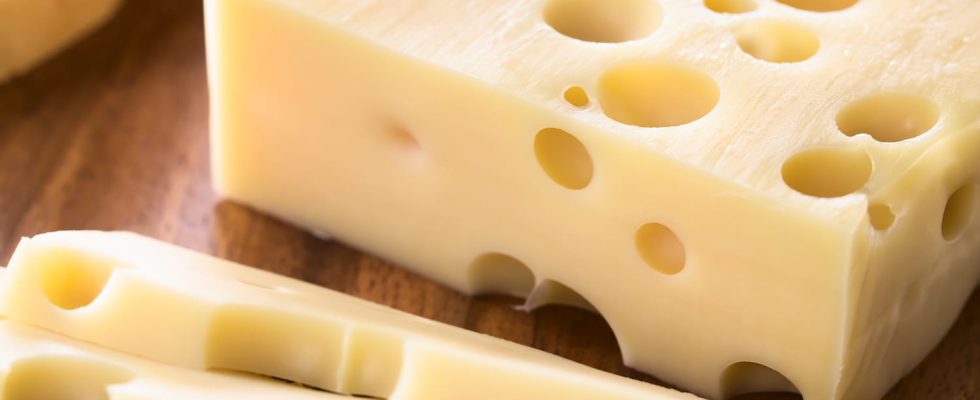With age, the risk of osteoporosis and bone fractures increases. Good news: a diet rich in calcium, magnesium and vitamins D and K helps strengthen our bone health.
Bones are not static tissues: they are in perpetual renewal throughout life and they can become fragile with age or mineral and vitamin deficiencies. And degraded or less dense bones are more prone to bone diseases likeosteoporosis where the bone fragility fractures. Bone strength largely depends on what we eat. even more among seniorsso to have good bone health, some minerals are essential. Here are the foods to favor.
Cheese
A “pleasure” food but not only that, cheeses are excellent sources of calcium, a mineral essential to bone health, particularly those with hard dough as the Parmesan cheese (1.2g per 100g, or 0.4g per serving), theEmmental (0.3g per serving), the county (0.3g per serving), the tome and the mimolette (0.25g per serving). Morbier, Cantal and Beaufort are also well equipped. they also contain a good content in vitamin D, zinc and potassium, trace elements important for bone strength. “Food intake in calcium and vitamin D are important factors in maximizing peak bone mass. They also help to maintain bone quality throughout life“, assures Inserm.
Sardines
Fatty fish with lots of benefitssardines (in oil) are excellent sources of phosphorus (490 mg per 100g), potassium (397 mg per 100g) of calcium (382 mg per 100g), vitamin D (2.33µg per 100g) and vitamin K (2.6 µg per 100g). Its composition makes it an essential food for maintaining good bone health. “Vitamin K has benefits for bone health and contributes to better bone calcification and therefore a limitation of fracture risk and this, thanks to the activation of a key protein in bone calcification: osteocalcin”, Dr Corinne Chicheportiche-Ayache, nutritionist, told us.
Game meat
Protein-rich foods like offal and game meats (pheasant, partridge, pigeon) are well supplied with phosphorus, an essential mineral element for bones. With calcium, it is one of the main components of bones and teeth. However, you should not eat too much game: health authorities recommend eating as much as possible one serving (150g) per week and ANSES advises against to women of childbearing age and children to consume wild game meat, to reduce the risk of lead poisoning.
Sesame seeds
Sesame seeds have a very interesting mineral profile: they are rich in calcium (140 mg for a 15g portion, i.e. 4 teaspoons) And in magnesium (50 mg for one serving), two minerals which actively participate in the mineralization and strength of bones. Sesame seeds are eaten sprinkled on salads or soups, or as ingredients to make breads, crackers, quiches or as tahini in hummus.
Watercress
Watercress is a leafy vegetable very rich in vitamin K (It is believed that it contains the most: 250 µg/100g), which contributes to good bone health. Furthermore, its richness in calcium (120 mg per 100g) effectively contributes to strengthening bones. It is eaten raw in winter salad for example, as a garnish in a sandwich or chopped in a vinaigrette. But also cooked, in a soup or a mash mixed with potatoes.
Milk
Milks and plant-based drinks are good sources of calcium. The best are sheep’s milk (475 mg for 250 ml, or one cup) and the soy drink (enriched with calcium) with 300 ml for 250 ml. Concerning cow’s milk, it is skimmed milk which contains the most calcium (305 mg per cup).
► Following a bone fracture due to osteoporosisthe body needs more protein than usual to rebuild yourself, warns the International Osteoporosis Foundation (IOF) which recommends that older people consume between 1.0 and 1.2 grams of protein per kilogram of body weight. This represents 25 to 50% more protein compared to the needs of adults aged 18 to 65. Food sources of protein are meat, fish, dairy products, eggs, soy foods and certain vegetarian meat substitutes, legumes, nutswhole grains, and, to some extent, vegetables.
► Several types of diets or foods could be unfavorable for bone health and are to be avoided, for example: the unbalanced so-called “Western” diet, characterized by excessive consumption of red meat, refined foods, sugars and processed foods; vegan and, to a lesser extent, vegetarian diets are associated with increased fracture risks and decreased bone mineral densities; Restrictive diets intended to lose weight should also be avoided in individuals who are not overweight or obese
- Osteoporosis: Weakened bones at risk of fracture – INSERM
- Osteoporosis – Foundation for Medical Research
- Dietary recommendations to prevent and treat osteoporosis – Nutritional Information and Resource Center
- International Osteoporosis Foundation (IOF)
